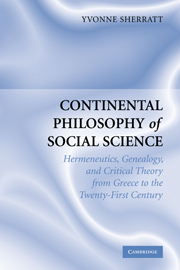Book contents
- Frontmatter
- Contents
- Preface
- Continental Philosophy of Social Science
- Introduction
- PART I THE TRADITION OF HERMENEUTICS
- PART II THE TRADITION OF GENEALOGY
- PART III CRITICAL THEORY
- Introduction
- 9 The History of Critical Theory
- 10 Critical Theory of the Early Frankfurt School
- 11 Innovations in Critical Theory: Adorno and Habermas
- Conclusion
- Bibliography
- Index
9 - The History of Critical Theory
Published online by Cambridge University Press: 23 November 2009
- Frontmatter
- Contents
- Preface
- Continental Philosophy of Social Science
- Introduction
- PART I THE TRADITION OF HERMENEUTICS
- PART II THE TRADITION OF GENEALOGY
- PART III CRITICAL THEORY
- Introduction
- 9 The History of Critical Theory
- 10 Critical Theory of the Early Frankfurt School
- 11 Innovations in Critical Theory: Adorno and Habermas
- Conclusion
- Bibliography
- Index
Summary
The Frankfurt School's project of critical theory has many historical debts; it would be remiss not to mention a deep past. Directly in tandem with other continental philosophies of the human sciences, critical theory is rooted in traditions, stemming back to concerns shared with the Ancients. Whilst no-one would claim that the Ancients had a type of critical analysis specifically labelled ‘critical theory’, the Greeks did have an early version of something similar through the figure of Socrates. First, Socratic thought was an attempt to discover truth through reasoned thought. It thereby followed the principles of the later Enlightenment. Truth was best discovered through the power of reason. Secondly, like critical theory, Socratic thought was an attempt to question internally the ‘logic’ of various arguments and suppositions. It did not look to external definitions for comparison but rather to the ‘correctness’ of the internal thought procedures themselves. In this vein Socrates developed a ‘method’ of internal questioning in order to clarify the processes of thought, and Plato depicted the Socratic dialogues and, indeed, first used the idea of ‘dialectic’. Whilst the twentieth-century derivations of both internal dialogue and dialectic are somewhat distinct from earlier Greek usage, the concerns of twentieth-century critical thinkers are remarkably similar.
The Ancient Greeks also influenced the Frankfurt School directly. The members of the School for example, were all well-read in the Ancients: in tragedy, in the Greek poets and in the philosophers, Socrates, Plato and Aristotle.
- Type
- Chapter
- Information
- Continental Philosophy of Social Science , pp. 179 - 197Publisher: Cambridge University PressPrint publication year: 2005



